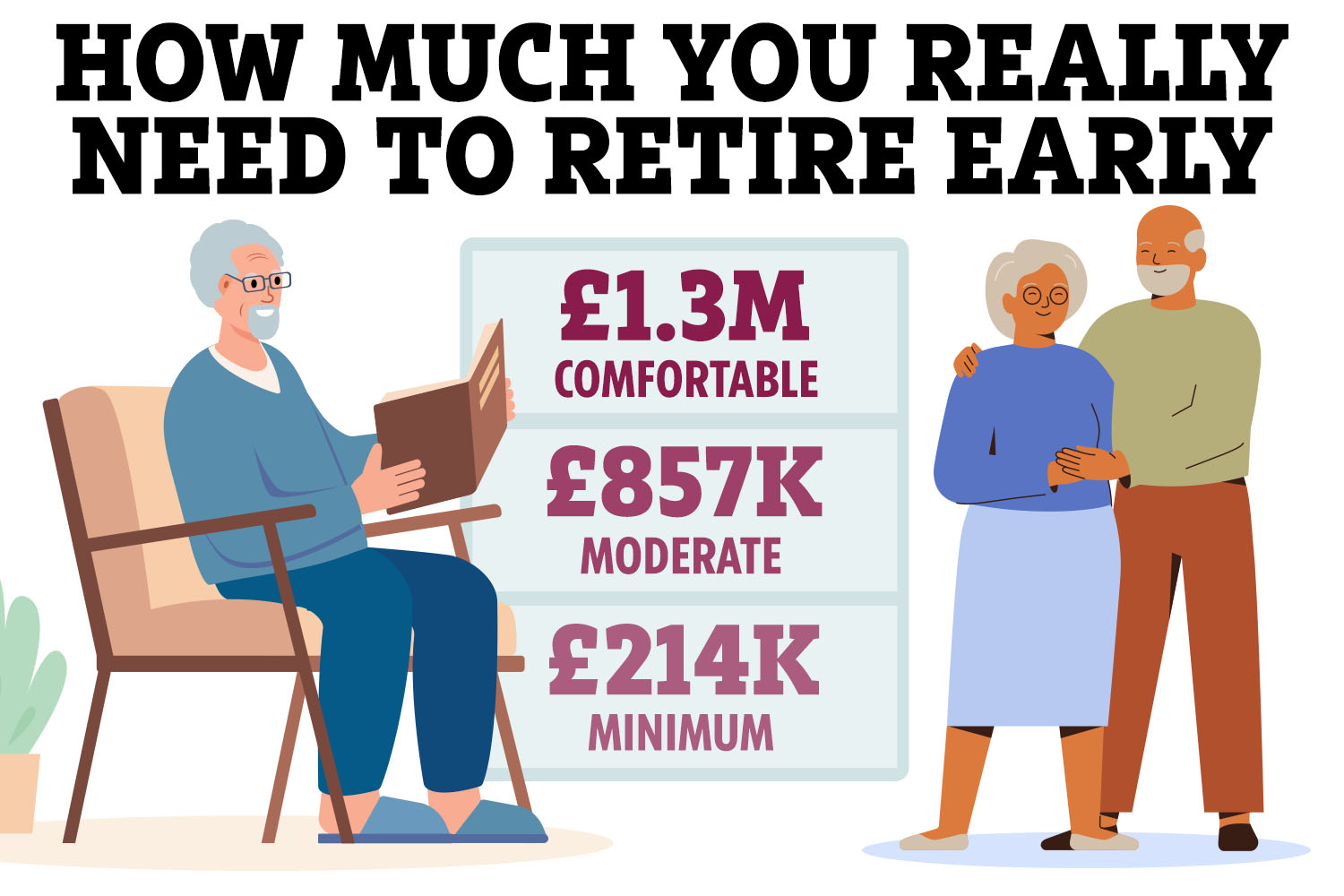Exact amount you need to retire comfortably at 55 and afford holidays abroad
6 min readANYONE hoping to retire early and still go on holiday abroad will need to save hundreds of thousands of pounds extra to live out their later years comfortably.
A 55-year-old finishing work in 2024 needs an average £1.3million saved up, according to number crunching by savings platform Interactive Investor.
That’s an extra £495,000 needed compared to finishing working at the state pension age of 67 with an £811,000 pot.
Retiring even seven years early at age 60 still requires a £1.1million pension pot – £315,000 more than waiting another seven years.
A comfortable retirement is defined by the Pension and Lifetime Savings Association (PLSA) as being able take a fortnight four-star holiday in the Mediterranean, plus three long weekend breaks in the UK.
You’d also be able to replace your car every five years and upgrade your kitchen and bathroom every 10 years or so, and spend up to £1,500 a year on new clothes.
Read more on pensions
If you’re aiming for a more moderate retirement you’d still need a pot of £857,000.
This standard of living means going on a three-star holiday in the Mediterranean and replacing your car every seven years.
The minimum you’d need to retire early at 55 is an extra £145,000 compared to retiring at 67, according to Interactive Investor.
You’d be able to afford a week-long UK holiday, wouldn’t have a car and would be able to spend around £100 a year on DIY around your property in this scenario.
Most read in Money
Alice Guy, head of pensions and savings at Interactive Investor, says: “Many of us dream of early retirement but to get there in style you’ll need a seriously large pension pot.
“With many of us living for longer, retiring early could mean you need to fund over 30 years in retirement and inflation has a big impact on how much you need, £100,000 saved now will be worth a lot less in 15 years, meaning you may need more than you think to achieve a decent standard of living in retirement.”
How much money do I need to retire early?
As we are living longer in retirement and everyday costs increase, the money we need to save into our pensions is dramatically increasing.
Retiring early means having even more saved to take you through a longer period without income from a job.
To have any hope of stopping work before the state pension age, you’ll need to start squirrelling extra into your nest egg – a lot extra, in fact.
If someone age 20 earning £35,000 saved the typical 10% of their pension they could have £430,000 after 35 years or their mid-50s, according to calculations by Interactive Investor that assume 5% investment growth a year with a 2% increase in contributions a year. That’s enough to retire to a minimum standard.
If the same person upped their contributions by £50 a month they could have £488,000 by age 55 and £674,000 by age 60 – still putting them on course for a moderate retirement.
Someone would need to save around £600 per month from age 20 to reach £850k by the time they reach age 55.
Or equivalent to someone earning £50,000 saving around 15% of their salary for 35 years.
Someone would need to save around £900 per month from age 20 to reach £1.3 million needed for a comfortable retirement by the time they reach age 55.
Alice said: “Using a workplace pension or SIPP is one of the best methods to save for early retirement because your investment returns are sheltered from tax, and you’ll also get and additional tax boost and employer contributions when you pay into your pension.
“The magic of investment compounding means it’s often easier to get to your investment goals as your returns snowball over time.”
The earlier you start saving the easier it is to amass a bigger pot.
Alice added: “Starting early and keeping on plugging away with regularly investing is one of the best ways to build long term wealth.
“With the rising state pension age, it’s important to plan ahead and prioritise your future finances.
“For many of us, working into our late 60s simply isn’t appealing or even possible. In the future we’ll be increasingly reliant on our own pension savings to fund retirement, especially if we’re aiming to retire early.
“If you’re not on track with your pension then it’s important to remember that how much you need is very individual…
“If you can afford it then consider increasing your pension contributions as small increases really mount up and can make a big difference when it comes to retirement.”
It’s worth remembering that retirees can start to claim the state pension at 66, though if you’re retiring after 2026 you’re likely to see that minimum age rise.
Those claiming the full flat rate state pension now receive £221.20 a week, equal to £11, 501 a year.
Not everyone qualifies for the full amount.
How does the state pension work?
AT the moment the current state pension is paid to both men and women from age 66 – but it’s due to rise to 67 by 2028 and 68 by 2046.
The state pension is a recurring payment from the government most Brits start getting when they reach State Pension age.
But not everyone gets the same amount, and you are awarded depending on your National Insurance record.
For most pensioners, it forms only part of their retirement income, as they could have other pots from a workplace pension, earning and savings.
The new state pension is based on people’s National Insurance records.
Workers must have 35 qualifying years of National Insurance to get the maximum amount of the new state pension.
You earn National Insurance qualifying years through work, or by getting credits, for instance when you are looking after children and claiming child benefit.
If you have gaps, you can top up your record by paying in voluntary National Insurance contributions.
To get the old, full basic state pension, you will need 30 years of contributions or credits.
You will need at least 10 years on your NI record to get any state pension.
If you have any gaps in your career, you may have paid less national insurance and would receive a smaller state pension to reflect that.
You can top up your national insurance contributions though.
How to save for retirement
Anyone planning their retirement needs to do some careful calculations about how much they will need to afford the lifestyle they want.
A good starting point is the Government state pension age calculator, which will tell you at what age you will receive your state pension.
Pension calculators can also help you work out how much money you need to be saving to have the pension pot you want at retirement.
The earlier you start saving, the easier it is as your money has longer to grow.
READ MORE SUN STORIES
And you’re not on your own when it comes to saving for retirement.
Your workplace will almost certainly contribute some money to your pension pot too, and you get tax relief from the government which reduces the amount you have to pay in yourself.
What is pensions auto-enrolment?
HERE’s what you need to know about pensions auto-enrolment:
What is pension auto-enrolment?
Since October 2012, employers have had to enrol their staff into workplace pension schemes as part of a government initiative to get people to save more for retirement.
When does auto-enrolment apply?
You will be automatically enrolled into your work’s pension scheme if you meet the following criteria:
- You aren’t already in a qualifying workplace scheme.
- You are aged at least 22.
- You are below state pension age.
- You earn more than £10,000 a year
- You work in the UK.
How much do I contribute?
There are minimum contributions that you and your employer must pay.
Your minimum contribution applies to anything you earn over £6,240 up to a limit of £50,270 in the current tax year. This includes overtime and bonus payments.
A minimum of 8% must be paid into the pension, with you contributing 5% and your employer paying at least 3%.
What if I have more than one job?
For people with more than one job, each job is treated separately for automatic enrolment purposes.
Each of your employers will check whether you’re eligible to join their pension scheme. If you are, then you’ll be automatically enrolled in that employer’s workplace pension scheme.
Can I opt out?
You can choose to opt out, but you’ll miss out on the contributions from the government and from your employer. If you do choose to opt out you can opt back in later.
Discover more from Slow Travel News
Subscribe to get the latest posts sent to your email.




